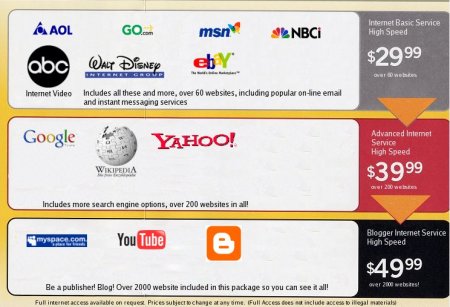A Well-Regulated Series of Tubes?
Um, did we just get net neutrality by fiat? Maybe. Having been stymied in previous attempts to regulate internet access, Federal Communications Commission Chairman Julius Genachowski just made the Internet subject to Title II of the Communications Act, which are the rules telephone networks follow.
Generally, Title II requires common carriers to provide service ‘upon reasonable request therefor,’ and at a ‘just and reasonable’ rate. Under Title II, common carriers are also required to provide services without “unjust or unreasonable discrimination in charges, practices, classifications, regulations, facilities, or services.’
In addition, the Act requires certain carriers to provide potential competitors with access to their network. Entities regulated under Title II may also be subject to additional requirements governing universal service support, the provision of disability access, public safety, consumer protection, and law enforcement access.
Basically, the FCC has gone nuclear: Internet service providers are going to have to provide all of the neutral treatment for users that comes along with phone service. Of course, this new set of rules might be reversed if the inevitable court challenge holds that the FCC didn’t consider its options thoroughly enough (aka if the telcos convince a judge that they’re being persecuted by the big, scary FCC).
In a reversal most poetic, these are the same regulations that were welcomed by AT&T when it was the most monolithic and monopolistic company in the world. “Regulate us!” said Theodore Newton Vail, monopolist extraordinaire. Vailism welcomed regulation as a better option than being forcibly broken into tiny chunks of a company, and that philosophy allowed AT&T to remain the biggest company in the universe (for a while). Of course AT&T would be happy to tell legislators just how to regulate AT&T; who else could know how to regulate that notoriously closed system better?
For context, telecommunications (cable, DSL, satellite, fiber-optics, etc.) implicate the natural monopoly known as the “last mile monopoly.” The initial investment into the phyiscal infrastructure (i.e., laying the pipes) is a huge up-front cost, but once the groundwork is done, providing the service is an insignificant cost and the monopolistically price-fixed revenues just roll in to cover the fixed costs and then some. In sum: HUGE barriers to entry, HUGE returns to investment, HUGE consumer surplus extraction. Competitors have little ability to raise the cash necessary to enter markets that already have a significant player, and even less incentive to engage in the oligopolistic price war which would follow. One of the few reasons there is any competition at all is because of media convergence: because content can be broken down into a series of bits–ones and zeros–any pipe can deliver the same digital content. It can be phone lines, television cable, satellite dishes, or anything else that actually comes through your front door. And now that the pipes are already there and the data transport is becoming more efficient, nobody is making any physical infrastructure investments, at least not comprehensively. (FiOS is admittedly a noteworthy entrant in terms of new and better pipes, but I would expect it to only show up where population density justifies the heavy per-foot investment, so don’t expect it to provide much in the way of unbridled media competition and democracy) Enter the FCC, with a mandate only to regulate those pipes but not what goes through them.
Each previously monopolistic telco is facing competition from services it didn’t realize could get into their business, telcos have lashed out and tried to protect the honeypot that is internet access. They have largely done so by resisting regulation and extracting more and more revenue from their existing consumers as well as content providers because the costs of switching providers are so high. And of course they have the “audacity” to claim that they own those pipes. To quickly dismiss that argument, of course they own the physical pipes, but that should not, cannot, entitle the carriers to viciously extract the consumer surplus that is more properly associated with the non-physical content that travels therein. ISPs are simply in the bottleneck position in the chain of service-delivery, but a democracy should not sit idly by while ISPs seek to choke off content that has serious implications on the freedom of speech, regardless of how much profitability that decision might diminish. That profitability necessarily comes from skimming a little from both you and the content trying to reach you. How would you feel about having the “option” of choosing between these service packages?

Part of the problem is that we live in a democracy with political systems as closed-off as AT&T of yore, so under the Bush Administration, telecos were insulated from the aggressive antitrust policies and forced (even if artificial) competition the public deserves. (N.B.: AT&T is the largest political contributor of any corporation. Ever.) Telcos forge non-competition deals, such as exclusive iPhone licensing and get away with it because it’s “good for the economy.” Even so, the judicial and legislative roadblocks to agency action prevent the FCC from moving as quickly as the telcos, and in the telecommunications industry, there are only the quick and the dead. Instead, the FCC has to slog through mind-bogglingly expensive legal battles over technicalities in whether the decision went through the right processes, regardless of whether the decision was the right one for the public’s interest. The DOJ Antitrust division under Obama might do something about the problem, and luckily the content providers want to get at consumers more freely as well, so Google might stand for some shred of freedom. But without a more permanent change to the way the game is played, this is going to remain a Goliath vs. Goliath tale.
So consumers, don’t put away the lube so fast; be ready bend over for the pipe-layers that are going to keep trying to fuck you every and any way they can.
Damn. And I thought I could go an entire post without making that pun. Who am I kidding?
Trackbacks